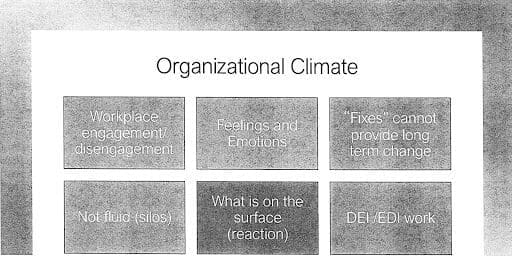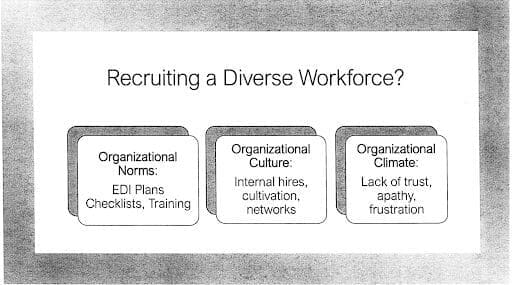A cultural virus’ latest mutation has infected Texas governments at multiple levels, even reaching into the state library. There’s a high risk to the state’s culture if public servants do not eradicate this virus.
Throughout this investigative series, Texas Scorecard has exposed how a woke ideology commonly called diversity, equity, and inclusion (but in practice is divide, excommunicate, and indoctrinate), has been wrecking American culture.
It infected the business world, most notably the film industry. The greatest example of this has been The Walt Disney Company. The once family-friendly enterprise has veered so violently away from the principles of its founder that last year, after internal dissent, it publicly opposed a parental rights bill in Florida.
This ideology pits big business against huge swathes of the populace, and devalues once mighty brand names. But the pushers of this cultural virus will not stop, and have mutated it to infect governments at the federal, state, and local levels.
This pandemic has reached the Lone Star State. In the second and third articles of this series, Texas Scorecard exposed its infestation in multiple local governments in Texas. It was also found in the state’s library.
History hints that if Texas’ public servants do not purge these harmful practices, the consequences could be dire.
Back to the Future
It was April 2001 in the state of Ohio, and the city of Cincinnati was gripped with three days of riots after the police shooting of a black American man. Peter Bronson, former columnist with the Cincinnati Enquirer, wrote about the senseless violence. His writings are recorded in his 2003 book “Cincinnati…For Pete’s Sake.”
“I heard a woman at the special [city] council meeting on Tuesday. She called our elected leaders murderers, slave masters, official criminals of South Africa, Gestapo and KKK in disguise. Then, without a blush, she said, ‘If you look for the good in others you might see the good in yourself,” Bronson wrote. “Unbelievable. Unless you have watched council meetings turned into bizarre circuses for more than a year by race-hustlers who spout vicious anti-Semitism and toxic racism.”
Some people warned it could get out of control. Council members said “no big deal” and did nothing.
Bronson also painted a dark picture of what Cincinnati at that time had become. “Scared. Angry. Divided. Discouraged. And deep-down certain there’s nothing we can do to prevent an instant replay.”
It wasn’t that long ago that the left seized upon the tragic death of George Floyd and pushed destructive riots nationwide. This is the threat to Texas if this insurgency implanted deep within our state and local governments are allowed to fester.
Dewey-decimal DEI
Last month, Texas Scorecard reported that the Texas State Library and Archives Commission (TSLAC) was looking to hire a “Library Management and Equity Consultant.”
That position as advertised would “plan, coordinate, implement, present, and evaluate a statewide program of learning on various topics including equitable, inclusive public library management.” The consultant would also have “considerable latitude” to start new programs and suggest policy changes to people at multiple levels within the state library
The state agency said it was looking for applicants with experience in “EDIA,” or equity, diversity, inclusion, and accessibility.
All seven TSLAC board members were appointed by Gov. Greg Abbott, and confirmed by the Texas Senate.
After public exposure, they removed the job posting. While a positive result, this event did raise questions as to how deeply infested the Texas State Library and Archives Commission was with the woke cultural virus. There were already multiple instances of promoting homosexuality and DEI that had occurred within the agency.
Texas Scorecard sent an open records request for staff training materials, curriculum, internal guidelines, requirements, and policies on DEI, and/or its parent virus: environmental, social, and governance (ESG). In response, the commission sent 17 pages of records. Page 2 of these records proved the existence of a DEI committee within. However, the letters were rearranged to EDI, but it was evident that the Divide, Ex-Communicate, and Indoctrinate virus was mutating within TSLAC. “The Equity, Diversity, and Inclusion (EDI) Committee consists of staff from every division in TSLAC, but all TSLAC employees play a part in the creation of an even more successful workplace,” the record stated. This was from page 6 page of the commission’s employee guide, dated January 4, 2022.
The responsive records also showed the EDI committee would be replaced by a Staff Equity Council (SEI). This would be “a standing volunteer staff group formed to provide recommendations to TSLAC management on issues, activities, and goals related to internal equity, diversity, inclusion, and accessibility (EDIA),” the records reported.
It emphasized that the SEC “is not a policy-making body,” nor is it “an arm of the agency’s Human Resource Department and does not have responsibility for managing any employee-related complaints.” But it does “provide insights and recommendations to TSLAC management for consideration and/or implementation.” Additionally, the woke council “will be asked for input on key areas” involving “current and future employees.”
The SEC Council is a forum for staff to discuss related issues for the consideration and potential action by management.
The records indicated that the SEC would be formalized by June 1, 2022, and nominations for membership would start the month before. Membership would be capped at ten, with one year terms that could go as high as two consecutive years. Half of the members of the first SEC’s membership would serve 18 months in order for the council to have staggered terms. Once membership is settled, the EDIA Committee would disappear.
It was very clear that TSLAC management was deeply involved with this committee. The records stated that “the EDIA Committee chair and Director will work with division directors to finalize council membership.” Furthermore, “The Director and Librarian, General Counsel, and HR Manager will meet with the SEC Council at its quarterly meetings and provide updates related to EDIA initiatives and goals.”
One of the topics the SEC “shall provide advice on” is “recommending solutions to remove systemic and system barriers.” The term “systemic” has become a popular phrase statists use to promote cultural division and defunding police. A football player, with a more than $8 million contract at the time, once used the phrase “systemic oppression” to describe former Vice President Mike Pence leaving a football game when players knelt during the national anthem. That player’s last NFL contract was for more than $22 million.
Another of the topics the SEC “shall” advise on is “sharing high-level, strategic reflections on EDIA-related priorities.”
The Council would also “discuss and provide feedback” on TSLAC “policies, documents, and practices” assigned to them by management. They would also “recommend training opportunities” for all employees of TSLAC to management that would “further the understanding and values of EDI principles.” Again, EDI appears to be just a rearranging of letters so it doesn’t look like what it is: DEI.
As further confirmation of how deeply connected TSLAC management is to this Staff Equity Council, records report that “[the] Director and Librarian, General Counsel, and HR Manager” would attend quarterly meetings and “be responsible for” multiple items. Among those are the following:
- Providing updates to the Council and staff on EDIA initiatives and goals and, in consultation with the administrative team, for determining what council recommendations to implement.
- Guiding the Administrative Team with identifying and developing an Equity, Diversity, Inclusion And Accessibility Plan, EDIA initiatives, and goals at Administrative Team Meetings (ATM) or determined by leadership.
- Liaise between the Council and Administrative Team and determine direction/plan of action for issues brought up by Council.
- Assist with planning trainings for managers and supervisors.
Taxpayers would be helping fund the council’s indoctrination efforts, as council members “shall be authorized 12 hours of work time per quarter to complete the work of the Council.” This would include “participating in the quarterly meeting and conducting any review, research, or discussion as determined by the chair, co-chair, and council.”
Clearly, the purpose of the SEC was to ensure the complete and total infestation of the woke mind virus throughout the Texas State Library and Archives Commission. Included in these records was evidence this infection had been taking place for some time.
Contact Tracing
On June 24, 2021, a DEI training session was held at TSLAC titled “Organizational Climate, Norms, and Culture.” It was taught by Elaina Norlin.
Slides from Norlin’s presentation were included in the records. But before reviewing those, it’s important to examine Norlin’s background.
In October 2019, Norlin was hired by the Association of Southeastern Research Libraries (ASERL) to be their Program Coordinator for Professional Development. In this job, she would pilot new activities at the organization in order to “advance ASERL’s” goals for DEI.
Norlin did not respond to Texas Scorecard’s request for an interview before publication.
At the time, Norlin was writing a book “for the American Library Association on DEI strategies” that the ASERL press release claimed worked in “corporate/non-library settings.” Texas Scorecard’s first article in investigative this series reported on the destruction DEI ideologies have wrought in the private sector and in culture.
A deeper dive into ASERL’s DEI policy found its DEI committee had members from public universities nationwide, though Texas did not appear to be represented.
ASERL’s “Diversity & Inclusion Programming” statement, dated May 31, 2018, confirmed their program was rooted in those opposed to self-governance. Their definition for “diversity” came from the Brookings Institution, a well-known far-left organization in the nation’s capital. While the statement provides a link to Brookings’ web site, tellingly the link is now dead. An archived link is available.
The Brookings’ DEI policy statement at the time defined “diversity” to include homosexuality and also “gender identification.” The latter is a term often associated with the abusive medical procedures of gender mutilation and hormone manipulation. Texas Scorecard previously published a five article investigative series on this procedure, and its targeting of children in Texas.
Another part of ASERL’s “Diversity & Inclusion Programming” statement they adapted from Wake Forest University (WFU), located in North Carolina. Like the Brookings Institution, the link to WFU’s “Diversity and Inclusion Defined” source material is dead, but there is an archived link. WFU’s statement marginalized the American populace, promoted the DEI virus, and clearly stated they were in the business of spreading this cultural virus. “We want our students, faculty, and staff to possess the necessary attributes to influence individuals, groups, organizations, and systems that are unlike their own.”
One key point of WFU’s statement was pushing “Cultural Competence Education.”
“Inclusion involves an awareness of how culture influences behaviors. We’ve dedicated time and resources to develop cultural competence education programs that teach cultural competence to all university constituents,” the statement reads. Examples the statement provided included WFU’s “LGBTQ Safe Zone Training,” and “the Institute for Dismantling Racism (IDR).”
As previously reported, “Cultural Competence” showed up in Southlake, Texas back in July 2020. The Carroll Independent School District was implementing a “Cultural Competence Action Plan.” Dubbed the CCAP, this plan called for the district to “create a systemic process for consistently tracking and reporting microaggressions and incidents of discrimination.” It also required the establishment of a homosexual student focus group (grades 9-12), “an equity and inclusion grievance process system, and expand the school’s tip line to collect allegations of microaggressions.”
Parents united and fought back, changing the membership of the school board from district-controlled to citizen-focused.
As evidenced by the DEI cultural virus’ presence at the Texas State Library and Archives Commission, CCAP lives on elsewhere.
Encouraging Poor Performance?
An examination of the slides from Norlin’s June 2021 presentation (included in the records obtained from TSLAC) confirms that the DEI and EDI acronyms are interchangeable terms.

Source: Texas State Library and Archives Commission
Promoting more divisiveness marketed as diversity, the slides include a very clear plan to inject the DEI cultural virus agency wide. It also introduces the term “toxic leaders.”
The cultural left has previously attached the term “toxic” to “masculinity,” which is used to shame the majority of men for the actions of a few bad actors. This is done instead of promoting individual accountability and responsibility.
- Source: Texas State Library and Archives Commission
The full presentation, and rest of the records TSLAC provided Texas Scorecard are available here.
As for the presenter, Elaina Norlin, she has gotten around in spreading the toxic ideology of DEI. A closer examination of her work shows that she is promoting a parasitical relationship between employee and employer. This is devastating in the private sector, where it has to earn every penny it can to survive and thrive. It has massive implications in the public sector, where public servants can always hike taxpayer’s tax bills to feed their gluttonous desires.
Norlin led a “discussion and assessment of workplace culture” at Tulane University in New Orleans. She is scheduled to give the keynote address at San Jose State University’s “Celebration of Black History Month: Equity in Libraries, 2023 and Beyond” on February 23 of this year. Her biography states she has written two books and “delivered over 70 workshops, training sessions, presentations, and institutes both nationally and internationally on marketing, web usability design, facilitation, strategic influence, and conflict management.”
A book she has written is “The Six-Step Guide to Library Worker Engagement.” Obviously, one of the chapters is titled “Diversity[,] Equity, and Inclusion.” However, something else shows up that may reveal another catastrophic strand within the DEI virus. One of the topics the book is marketed as covering is “the rationale for eliminating annual performance reviews in favor of less formal one-on-one conversations and ‘just in time’ continuous feedback.”
This reduced-accountability appears to be a theme for her. In a December 2022 interview with Library Leadership Podcast, Norlin discussed her preference for “eliminating formal performance review processes in favor of one-on-one conversations and continuous feedback.”
She gave multiple snippets that raise questions about the viability of her ideas for the workplace.
“I didn’t realize until I started interviewing people who left the profession, and people who were disenchanted, or about to leave the profession—almost everybody I talked to had a bad experience with the performance evaluation,” she said. “You just never really realize, especially when you’re not communicating, and talking to your direct reports only a couple times a year—then you give them the evaluation that it means so much to the person, right? Just to get something that was lukewarm balanced with, here’s the five things you’re doing right, but here’s six things you’re doing wrong—is not making them feel like the recognition and praise value is being seen.”
While regular communication should definitely be encouraged from leadership with staff, yearly performance evaluations are essential to track one’s progress over the year, and check if they are helping accomplish the overall mission of the organization. It also puts on paper how you performed, setting a mark to be compared to prior and future years.
Abandonment of this practice risks encouraging staff to coast or sink. Either of which hurts your teammates.
What Norlin claimed she found through her research of organizations that “really work through their low morale” was that they turned their performance evaluations into celebrations of what the staff member accomplished. “They’re much more aware—not goal setting that might change, but more about where as you, as you’re evolving to the best person you can be at work, where do we feel like we need to support you more in order for you to blossom as that person?”
What’s missing from Norlin’s words is a very important concept: accountability. Something business consultant Patrick Lencioni emphasizes in his book “The Advantage: Why Organizational Health Trumps Everything Else.”
“Even well-intentioned members of a team need to be held accountable if a team is going to stick to its decisions and accomplish its goals,” Lencioni writes. “At its core, accountability is about having the courage to confront someone about their deficiencies and then to stand in the moment and deal with their reaction, which may not be pleasant. It is a selfless act, one rooted in a word that I don’t use lightly in a business book: love.”
Norlin’s statements during her interview further belied that what she was promoting was the employer-employee relationship being a one-way street, with only the employee benefiting. “I always find that the director is almost like the conductor of how to figure out all of these different people who are there, how can we put them together—harmoniously help people move forward?” she asked. “I think a lot of times we get bogged down because we expect people often to be similar … follow this line, here’s this policy, do it our way. Do it my way. I think a lot of times we get away from just the beauty of the diversity of thought that we have within the organization.”
This parasitic relationship proposal is scientifically shown not to work. The evidence is in Jim Collins’ much-heralded book “Good to Great,” where he and his team studied twenty-eight companies over five years to find out “how can good companies, mediocre companies, even bad companies achieve enduring greatness?”
Collins focused on not “diversity,” but the universal and non-bigoted standard of right and wrong.
“We expected that good-to-great leaders would begin by setting a new vision and strategy,” Collins wrote. Instead, they found that good-to-great leaders found the right people on the team, removed the wrong people, and put the right people in the right positions. Then they figured out where to go. “The old adage ‘People are your most important asset’ turns out to be wrong. People are not your most important asset. The right people are.”
Perhaps the most shocking take from Norlin’s interview was this statement she made:
Is there a way that we can creatively figure out other avenues for people to be in leadership that doesn’t require them to have to manage people? I think you can be a leader without that. I really do think having avenues for people who are really, really great, but the people stuff isn’t their jam can still thrive.
What’s at Stake
As Elon Musk said “The woke mind virus is either defeated or nothing else matters.”
Gov. Greg Abbott’s chief of staff, Gardner Pate, told all state agencies to eradicate their DEI policies as part of their employment practices this month. “When a state agency adjusts its employment practices based on factors other than merit, it is not following the law,” Pate wrote. “Further, when a state agency spends taxpayer dollars to fund offices, departments, or employee positions dedicated to promoting forbidden DEI initiatives, such actions are also inconsistent with the law.”
The letter did not indicate what steps the governor would take should state agencies and higher education continue to defiantly pursue DEI. As of yet, there is no announcement if Abbott intends to force local governments—which themselves are creations of the Texas Legislature—to eradicate their DEI infestations.
Texas Scorecard asked Pate about the multiple state and local governments this investigation found DEI had infected. We also asked Pate if Abbott would seek to eradicate the woke virus’ presence in the working environment at any level in state and local government. No response was received before publication.
This brings us back to the Cincinnati riots at the beginning of this piece, decades before wokeness was even a common term. Amid the fallout from the Cincinnati riots, Columnist Peter Bronson observed the divisiveness and fear before him. He responded to the unanswered question of whether or not dangerous and destructive actions like riots and pitting man against man are necessary in response to colorism and alleged injustice. In his book, Bronson pointed to the answer. “Anyone who claims to be in the light but hates his brother is still in the darkness,” 1 John 2:9.
No ads. No paywalls. No government grants. No corporate masters.
Just real news for real Texans.
Support Texas Scorecard to keep it that way!








